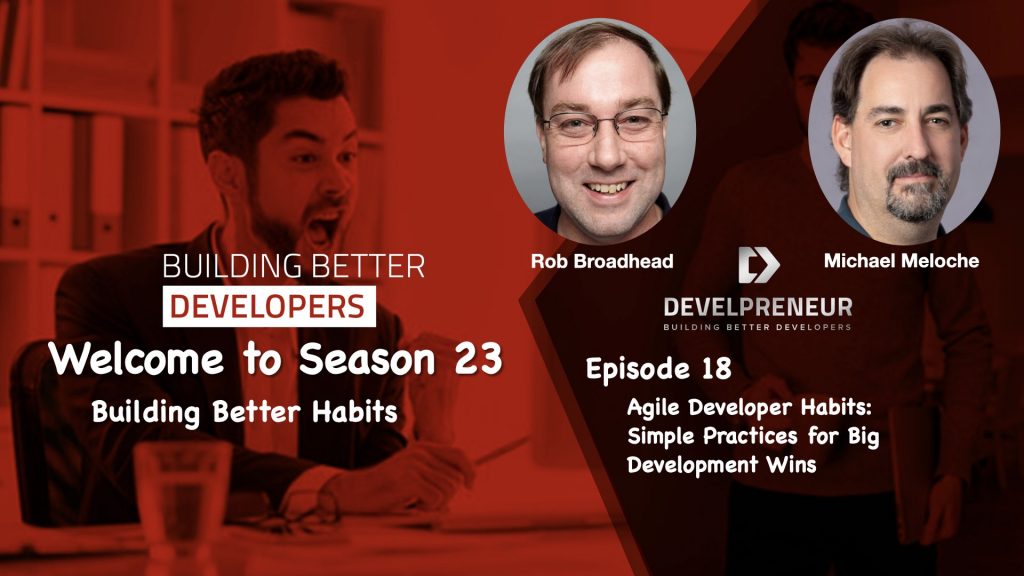Agile has become a cornerstone of modern development, yet the essence of its value often gets overshadowed by procedural or tool-based interpretations. In the recent Building Better Developers podcast, Rob Broadhead and Michael Meloche delve into the foundational principles of Agile and its relevance to building better developer habits, emphasizing adaptability and continuous improvement. Here’s a summary of their key insights and practical takeaways for cultivating an Agile mindset.
Understanding Agile: A Framework, Not a Formula
Agile isn’t a fixed set of tools or methodologies but a mindset underpinned by the Agile Manifesto’s four core values:
- Individuals and interactions over processes and tools.
- Working software over comprehensive documentation.
- Customer collaboration over contract negotiation.
- Responding to change over following a plan.
These values encourage focusing on people and outcomes, not rigid structures. Agile allows flexibility in navigating challenges, fostering collaboration, and driving solutions that truly matter.
Key Takeaways from the Episode
1. Pivoting Is a Strength, Not a Weakness
The hosts highlighted the importance of pivoting when a project encounters hurdles. Unlike the waterfall model, Agile embraces flexibility. For example, Michael shared a 16-hour development detour that required re-evaluating the approach when the original solution proved untenable. This adaptability, while frustrating in the moment, prevented further wasted effort and allowed the team to refocus.
2. Breaking Down Goals: The Ruler vs. Yardstick Approach
Agile replaces the traditional “yardstick” of fixed, linear progress with “six-inch rulers” of iterative development. This analogy underscores the value of short-term planning and regular evaluation to ensure the project remains aligned with goals, even if adjustments are needed.
3. Tools Are Helpers, Not the Rulebook
While tools like Jira and Trello are helpful for visualizing progress, Rob emphasized that developers should avoid becoming slaves to their tools. Instead, use them to enhance collaboration and accountability, ensuring they serve the project rather than dictate it.
4. Collaboration Over Negotiation
A major Agile tenet discussed was fostering collaboration with customers rather than fixating on rigid contract details. The hosts illustrated this with scenarios where understanding the “why” behind a customer’s request—like insisting on a purple button—can reveal insights that shape better solutions. Instead of challenging requests outright, developers should explore the reasoning, aligning efforts with true business needs.
Practical Agile Developer Habits
1. Revisit the Agile Manifesto Regularly
Even seasoned developers benefit from revisiting Agile’s principles to maintain focus on its core values. The manifesto and its 12 principles can serve as a moral compass, helping developers navigate project complexities.
2. Leverage Daily Sanity Checks
Inspired by tools like the Pomodoro technique, developers should periodically assess whether they are being productive or merely busy. This could involve reflecting on progress mid-day or after completing a sprint.
3. Plan Weekly and Adapt Daily
Rob proposed an excellent challenge: set weekly goals and adjust daily plans as needed. This builds the habit of agility while maintaining forward momentum.
4. Simplify Where Possible
Michael recommended automating repetitive tasks, such as server setups, to save time and reduce cognitive load. Iteration and simplicity go hand-in-hand with Agile values.
Agile Developer Habits in Action
Agile isn’t just for project managers or scrum masters—it’s a way of thinking that benefits individual developers and entire teams. By focusing on collaboration, adaptability, and meaningful progress, Agile fosters an environment where everyone can thrive.
If you’re new to Agile, start small. Explore tools like Trello or Jira to organize tasks, or dive into the Agile Manifesto for inspiration. Remember, building better habits begins with understanding the principles that drive meaningful change.
As the podcast hosts reminded listeners, Agile is about progress, not perfection. Whether you’re automating workflows, tackling blockers in a sprint, or refining your daily routine, embracing Agile values can elevate your development practice and help you build not just better software, but a better version of yourself.
Listener Challenge: Weekly Planning, Daily Adapting
1. Set Weekly Goals
At the start of the week, identify a few larger goals or tasks that you aim to complete within seven days. These should be substantial enough that they cannot be completed in a single day, requiring consistent progress.
2. Plan Daily Tasks
Each day, determine smaller tasks or steps that contribute to those larger goals. These tasks should be adaptable, meaning they can evolve based on progress or changing priorities.
3. Monitor Your Process
Pay attention to whether sticking to a fixed schedule (working on the same task at the same time daily) or adapting your workflow dynamically works better for you. Evaluate if adjustments improve productivity and align with the Agile principle of responding to change over following a rigid plan.
The goal of this challenge was to instill habits of flexibility and iterative progress, mimicking Agile’s core values while fostering personal and professional growth.
Stay Connected: Join the Develpreneur Community
We invite you to join our community and share your coding journey with us. Whether you’re a seasoned developer or just starting, there’s always room to learn and grow together. Contact us at [email protected] with your questions, feedback, or suggestions for future episodes. Together, let’s continue exploring the exciting world of software development.

